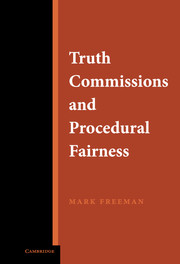Summary of Recommendations
Published online by Cambridge University Press: 27 October 2009
Summary
Statement Taking
Publicity and outreach
It is generally desirable for a truth commission's mandate to impose publicity and outreach obligations on the commission.
Whether or not the mandate imposes obligations, a commission should proactively advise the public as to when, how, where, and why it will be taking statements.
Publicity may be carried out by use of private and public media, the Internet, posters, and pamphlets.
Where resources are acutely limited, a commission should focus its outreach efforts on communities or regions where violations were known to be especially prevalent. On-site visits to such communities or regions should be considered.
Truth commissions should consider enlisting the participation of respected NGOs and other civil society actors to publicize the statement-taking process.
Nationals living abroad, particularly refugees, should be notified about the commission statement-taking process so that they may participate.
In all its public outreach work, a commission should articulate possible material consequences of not providing a statement. In particular, where a commission is mandated to develop a list of victims for a future reparation or compensation program, or to design and recommend such a program, or to do both, the commission should indicate whether failure to provide a statement could adversely affect eligibility.
Accessibility
Statements should be taken in locations, and using methods, that are physically and psychologically accessible. Accordingly, statements should be taken in neutral and convenient locations, during times that are considerate of deponents' schedules.
A commission should make statement taking accessible to the public generally, and to victims in particular, by as many means as possible. This might include any one or more of the following: creating regional or local offices, using a website (to which statements can be directly posted), and carrying out site visits to take statements in remote communities and in deponents' homes. In exceptional circumstances, effective access may require that statements be taken in undisclosed locations. (See “Receipt and Preservation of Confidential and Anonymous Statements.”)
[…]
- Type
- Chapter
- Information
- Truth Commissions and Procedural Fairness , pp. 301 - 316Publisher: Cambridge University PressPrint publication year: 2006



